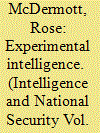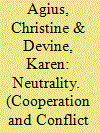| Srl | Item |
| 1 |
ID:
103578


|
|
|
|
|
| Publication |
2011.
|
| Summary/Abstract |
This article explores the use and application of experimental methodologies in intelligence analysis. Previous experimental work has much to tell us about how people process information in making judgments. Calibration, and how appropriate levels of confidence might be improved with systematic feedback, is addressed. Training around uncertainty biases is covered. Extant experimental work suggests mechanisms and tests which might be used to better screen potential analysts for personality characteristics that might make them more suited for some tasks over others. The paradigm of experimental manipulation serves as a useful template for exploring alternative conceptualizations of uncertain environments.
|
|
|
|
|
|
|
|
|
|
|
|
|
|
|
|
| 2 |
ID:
107614


|
|
|
|
|
| Publication |
2011.
|
| Summary/Abstract |
This article approaches 'neutrality' as an essentially contested concept and traces its meaning and purpose over centuries-long historical timelines and situated political, societal and security contexts. It distinguishes neutrality from other concepts such as 'neutralization' 'non-belligerency', 'non-alignment', 'military non-alignment', 'military neutrality' and 'non-allied'. The article explains the politics of defining neutrality in the current European political and legal landscape and in the context of shifting definitions and practices of war, peace, security and state sovereignty. This episteme-based analysis focuses on changes to neutrality in accordance with the rise and fall of particular empires and international actors over time, and changes to its status linked to the development and reification of particular meta-theoretically-based subfields of International Relations and Political Science, setting the background to this special issue of Cooperation and Conflict. A renewed emphasis on the normative aspects of neutrality (i.e. the role of domestic values, politics, preferences, history and mass publics in foreign policy formulation) is achieved by employing a range of perspectives, characterized by increased pluralism in levels of analysis and theoretical approaches. Through this pluralism, authors engage with (1) the strategic and normative drivers underpinning the norm of neutrality, (2) the potential for neutrals to serve as norm entrepreneurs in the field of peace promotion, (3) the tenuous legal status of elites' quasi-neutral foreign policy constructions underpinned by tensions between discourses and practices and (4) the discursive strategies underpinning the move from neutral states' traditional forms of neutrality to what is termed 'post-neutrality' in the current politico-legal context.
|
|
|
|
|
|
|
|
|
|
|
|
|
|
|
|